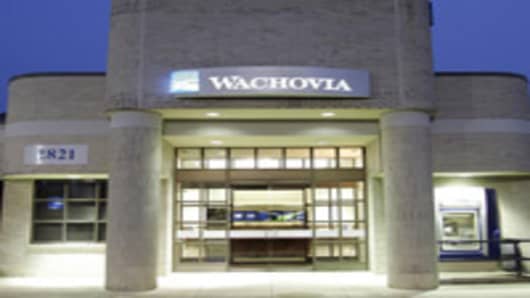Wachoviaposted a surprising first-quarter loss on Monday as credit problems from mortgages and other debt soared, prompting the fourth-largest U.S. bank to raise $7 billion of capital, slash its dividend and cut jobs.
The bank sold shares at a discount after boosting its reserves for credit losses 16-fold and writing off $1.56 billion of debt, largely tied to the nation's housing slump and strained credit markets. Several major U.S. lenders have raised capital and cut their dividends in recent months.
"These actions are not without cost and I wish they were not necessary, but they are," Chief Executive Ken Thompson said on a conference call. "We think it's the conservative course."
In morning trading, shares of Wachovia fell $2.83, or 10.2 percent, to $24.98. Most other major U.S. banks are scheduled to report quarterly results by April 22.
Wachovia has suffered from Thompson's ill-timed, $24.2 billion purchase of adjustable-rate mortgage lender Golden West Financial in 2006, near the peak of the U.S. housing boom. The bank said the nation's housing slump is only half over, and might not hit bottom until the middle of 2009.
Charlotte, North Carolina-based Wachovia has also been hurt in its capital markets unit, where it is a large packager of mortgage debt and provider of loans to fund corporate buyouts.
"The Golden West deal could go down as one of the worst-timed transactions in recent memory," said Gerard Cassidy, an analyst at RBC Capital Markets in Portland, Maine. "Whenever you grow too fast, and an economic slowdown comes, you pay the price."
First Loss Since 2001
Wachovia said its first-quarter net loss was $350 million and resulted in a loss of 20 cents per share. That compared with a year-earlier profit of $2.3 billion, or $1.20 per share. The quarterly loss was Wachovia's first since 2001.
Excluding special items, the loss was $270 million, or 14 cents per share. On that basis, analysts' average forecast was a profit of 47 cents per share, Reuters Estimates said.
Revenue fell 5 percent to $7.9 billion, short of the average forecast for $8.37 billion.
Wachovia set aside $2.83 billion for credit losses, up 16-fold from a year earlier. This included $1.1 billion for "Pick-a-Pay" mortgages that give homeowners payment options, including paying less than interest and principal due.
Results were hit hard in California, Golden West's former home. Net charge-offs quintupled to $765 million, and nonperforming assets more than quadrupled to $8.37 billion.
The bank cut its quarterly dividend 41 percent to 37.5 cents per share from 64 cents, saving $2.1 billion of capital a year. Thompson in January had said the dividend was safe.
Wachovia sold $3.5 billion of common stock at $24 per share, or 13.7 percent below its Friday closing price. It also sold $3.5 billion of preferred shares with a 7.5 percent dividend and convertible into stock at a 30 percent premium.
Both offerings may grow 15 percent, boosting the sum raised to $8.05 billion. Wachovia plans no stock buybacks this year.
"They needed to do this," said Lee Delaporte, director of research at Dreman Value Management in Jersey City, New Jersey, which invests $19 billion and owns Wachovia shares. "They're heavily exposed to some difficult areas."
Wachovia joins struggling lenders such as Citigroup and Washington Mutual in raising capital, and Citigroup and National City in cutting dividends.
Investment Banking Jobs Cut
Chief Financial Officer Tom Wurtz said the markets and investment banking unit will cut 12 percent of staff this quarter, on top of similar cuts since the beginning of 2007.
The unit lost $77 million in the first quarter, including write-downs of $521 million tied to commercial mortgages, $339 million for subprime mortgages, $309 million for loans to fund corporate buyouts, $251 million for consumer mortgages, and $144 million for non-subprime debt.
Wachovia ended March with a Tier-1 capital ratio of 7.5 percent, up from 7.4 percent at the end of 2007, despite selling $3.5 billion of preferred stock. The ratio measures its ability to cover losses. Regulators deem 6 percent sufficient. Wachovia expects a ratio near 8.75 percent by the end of 2009.
"The board has to look very carefully at what went wrong and make decisions on senior management," said RBC's Cassidy. "The credibility of management has been damaged."
Before the Golden West merger, Thompson had largely shed his predecessor's reputation for bad acquisitions. Cassidy said he was not calling for Thompson's removal. RBC rates Wachovia "sector perform."
Profit in consumer and business banking, Wachovia's largest unit, fell 17 percent to $1.2 billion.
Profit rose 22 percent in capital management to $381 million, and rose 10 percent to $92 million in wealth management.
Wachovia ended March with $783.6 billion of assets. Through Friday, its stock was down 26.9 percent in 2008, compared with the Philadelphia KBW Bank Index's 10.9 percent drop.


